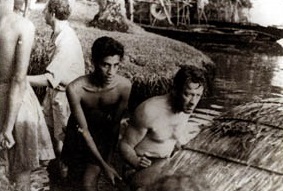 I watched last night on the BBC a deeply affecting documentary film by Helen Langridge entitled ‘Moving Half the Mountain’. At the centre of the film was the story of the building of what became commonly known as the ‘Death Railway’ in Burma during the Second World War.
I watched last night on the BBC a deeply affecting documentary film by Helen Langridge entitled ‘Moving Half the Mountain’. At the centre of the film was the story of the building of what became commonly known as the ‘Death Railway’ in Burma during the Second World War.
Those of us who grew up with Alec Guinness in David Lean’s epic “Bridge on the River Kwai” (based on the eponymous French novel by Pierre Boulle) will be broadly familiar with the subject, should this be only because – having been absorbed by the film – we engaged in further research to establish the real truth behind this regrettable chapter in the history of mans’ inhumanity.
It is not – however – the narrative itself that imbues this impressive new documentary with its power to move. That comes – as it so often does – from the testament of those directly involved – from the thoughts and memories of the British and Japanese soldiers that survive still – and who agreed to be interviewed for the film.
The British had been caught up in the cataclysmic events that lead to the disastrous fall of Singapore in February 1942 and were subsequently marched up the Malaysian peninsula and into Burma, where they were ill-used by the Japanese as slave labour to build a railway linking Burma and Thailand. Forced to work in appalling conditions it is believed that a total of some 100,000 men – including more than 6,000 British servicemen – perished in pursuance of this objective.
Of those that survived the ordeal many have never spoken in depth about their experiences – even to their loved ones. That these men have chosen to do so now is a result of most of them being in their 90s, some having even achieved their centenaries. It would be a further tragedy were their testaments to be lost without being heard.
Affecting though they may be – however – their stories are not the most telling element of the film. What really moves is the demeanour of the survivors themselves. Almost to a man they demonstrate a degree of forgiveness, of acknowledgement, of coming to terms with their experience – that is humbling in the extreme. These men had come face to face with the very worst of which mankind is capable, and their survival – and subsequently fulfilled lives – leave us a lesson the we would do well to heed.
In the light of some of the more unpleasantly revisionist thinking that seems to be prevalent in this centenary year of the outbreak of the Great War, I would strongly recommend the viewing of this excellent film to any tempted to make glib judgements as to the expediency of warfare.
Tags: History, Loss, Modern life


Recent Comments